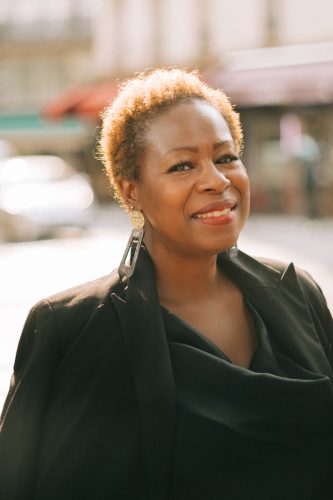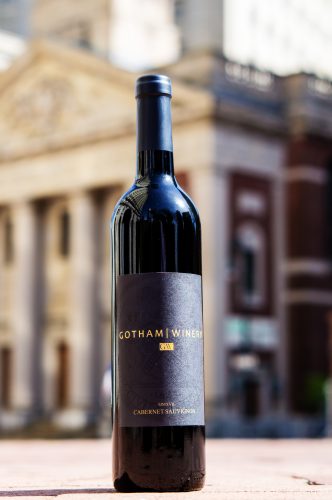Is the wine industry inclusive?
- Like
- Digg
- Del
- Tumblr
- VKontakte
- Buffer
- Love This
- Odnoklassniki
- Meneame
- Blogger
- Amazon
- Yahoo Mail
- Gmail
- AOL
- Newsvine
- HackerNews
- Evernote
- MySpace
- Mail.ru
- Viadeo
- Line
- Comments
- Yummly
- SMS
- Viber
- Telegram
- Subscribe
- Skype
- Facebook Messenger
- Kakao
- LiveJournal
- Yammer
- Edgar
- Fintel
- Mix
- Instapaper
- Copy Link
Posted: 9 September 2021 | Bethan Gyrlls (New Food), Mecca Ibrahim | No comments yet
Bethan Grylls and Mecca Ibrahim interview a number of wine experts to find out whether the sector, which has been deemed as not diverse enough, has made any significant improvements.


If the wine sector wants to survive, it must have a drastic rethink about the way in which it represents and relates to the world today.
In this article, Mex and I teamed up to look at the wine sector, which has been called out for its lack of diversity, to see how it’s faring today.
This article includes references to previously published work, interviews we conducted ourselves, and quotes taken from a session at the Unified Wine & Grape Symposium – a trade show held each year in Sacramento, California, US, entitled Strength in Diversity: Achieving Meaningful Change for Business Success in the Wine Industry.
A lack of diversity in wine
Based in New York City, Gotham Winery is a craft winemaker, founded by Kwaw Amos, with a modern outlook.
The brand aims to develop wines which appeal to today’s “curious” wine drinkers – essentially, it looks to deliver beverages which are affordable whilst being “complex, fruit forward and easy to drink” to appeal to the wide-varying palettes of customers.


Kwaw Amos
Amos’ background is actually finance but his love for wine began straight after college and prompted him to launch his own business.
“I didn’t think the market was ‘speaking’ to its audience sufficiently,” he explained. “Wine is often seen as this aspirational drink, something you have to reach for rather than being something that reaches out to you. I wanted to create a brand that modern consumers identified with.”
He continued: “There’s a lack of diversity in the sector. As a black entrepreneur, it’s important for me to change that. Every new entrepreneur needs support, but that support seems to be far and few between for those in the black community. I work to provide opportunities for those in underrepresented groups.
“Diversity is so important – if the wine sector is to survive, it needs to be able to relate to a wider range of consumers. It also needs that diversity of thought; we’re facing a huge climate crisis and we need to start thinking differently and innovating.”
And, as sommelier Vinny Eng, noted in a virtual panel on diversity earlier this year (Strength in Diversity): “Racism is expensive. It has cost this industry so much money in terms of lost talent, in terms of consumers who have gone to other brands, and other beverages, because they feel that the wine industry has been tone deaf and inconsiderate.”
“I have been working in the UK’s wine industry since 2013 for various companies, mostly large wine importers, but there are very few colleagues who are from ethnic minority backgrounds,” Leona de Pasquale, Head of Training at WineEd, a WSET Certified Educator, wine judge, and a Master of Wine student, told us.
“In 2013, when I was working for a big wine event company in London, around two to three percent of my colleagues were from ethnic minority backgrounds. And I do believe there is still a lack of diversity.
“For some cultures like the one where I am from (Taiwan), wine is not a big part of our daily life. So naturally, working in the wine sector is not on the top of people’s dream job list. But I believe everyone who is working in the sector can take a lead by telling people about their positive experiences. After all, there are many different roles in the sector and not everyone has to be a wine expert or tasting wines all the time (if that is what you worry about!).”
The lack of diversity in the wine sector is not an unknown problem and there have been several reports which have highlighted issues with inclusion. An article in Seven Fifty Daily by journalist, Dorothy J Gaiter, expressed her dismay over the little headway we have made and echoed Amos’ sentiments. “The killing of George Floyd, the resulting protests, and the disproportionate impact of COVID-19 on communities of color have heightened my anger at how little progress we’ve made toward justice and equality – both in our country and in the wine industry,” she wrote.
Gaiter pointed out that racism and inequality continue to wreak havoc because “too many people tolerate it”. Her column also underscored the modest action the wine sector is taking to promote inclusion, which she describes as nothing more than empty promises.


Tanisha Townsend
Commenting on this point, she wrote: “Which is both maddening as well as foolish for an industry that needs to grow its consumer base.”
Julia Coney also broached this issue in a blog post that she wrote in response to Karen MacNeil’s article ‘Beyond the Wine Glass – A New Glass Ceiling’, which raised issue with a lack of gender balance in the wine sector. The problem, as Coney’s response flagged, was that she “did not see one African-American woman among the photos” posted alongside the article. “I’m certain you [MacNeil] didn’t ask one,” she commented.
She continued in her post: “To quote you [MacNeil]. ‘The fact remains that the wine industry needs more women’. I want to add to that statement. The fact remains that the wine industry needs more women, more people of color in wine media, wine journalism, winemaking, and more support for the people in our industry who are not recognized.”
This point has been emphasised by Dan Vu, Marketing Director of E. & J. Gallo’s Barefoot Wine, who mentioned it during the Strength in Diversity session held earlier this year. “Are we really that welcoming? [In terms of an outreach to black consumers], in particular it’s black women who feel, ‘We like wine, we like the idea of wine, but we don’t feel loved by wine.’ […] We need to make sure that this community feels welcomed by the wine industry.”
Wine educator and consultant Tanisha Townsend also spoke about the barriers to entry in the wine industry and a feeling of estrangement. “Just because something is ‘open’ to you that doesn’t mean that it’s a welcoming atmosphere and everyone is made to feel like they belong,” she explained.
“We can change this by having conversations around it, creating and continuing mentorship and scholarship programmes. The more communities that are built in the industry and the more active people are, the more others will look up and think, ‘Wow, ok…I think there is a place for me here, I can do this!’”
Fear is a barrier
It’s wonderful that we live in an age now where things are becoming more balanced – but while we have some distance to go until we reach an equilibrium, we’re also living in a world where one misstep can dish out a whole lot of nastiness.
As such there is a fear factor, and we seriously need to address it.
What is right seems to change on a daily basis and although it’s great to see positive change, are there situations in which we are taking this too far, or reacting in a way which is too aggressive when one makes an innocent mistake?
As Stephen Fry so controversially (or perhaps not…) stated, while he wants everyone to feel comfortable in the world, he doesn’t believe “political correctness is the way to achieve that”.
Theresa Heredia, a winemaker from Gary Farrell Winery, raised this point during the aforementioned Strength in Diversity session.
“The fear is real,” she said, “the fear of misstepping, of saying the wrong thing to somebody. That fear is like a giant wall that’s been preventing us from having these discussions and preventing us from moving forward and making it seem as though we don’t want to have diversity in the wine industry, and we do. We really do. We can’t let people of colour do all the work for us.”
As Heredia told the audience, it’s time to “rip the band-aid off” and begin to reach out to people.
“Working on equity and inclusivity at our organisations is how we’re going to get over the fear,” Heredia advised during the session. “Teaching everyone on staff how to talk to one another. We can’t be afraid of speaking about race. We can’t be afraid to talk about diversity. We have to be able to engage and ask questions.”
Indeed. Only by asking questions can we start to improve things, so as a society we not only need to start asking these questions, but we also need to be forgiving of those asking them. How else otherwise can we ever learn what is right?
Has anything changed in the wine sector?
During our research to put this article together, it seemed that progress in the wine sector has been pretty slow but there has been some.
In a brief chat over Linked In with Gaiter, she pointed us in the direction of a blog post she’d written last year which highlighted some signs of progress towards a more inclusive wine culture.
For example, Coney has established Black Wine Professionals, a database of writers, speakers, educators, retailers, etc., which also provides educational and mentoring tools. We also saw the first black woman appear on the cover of a Wine Enthusiast’s 40 Under 40 Issue.
Townsend also highlighted some progression in this regard, commenting on how pleased she was to see that more diverse groups were forming within the wine industry and feels encouraged by progress. “The creation of programmes such as Be Inclusive Hospitality in the UK and Wine Unify and Black Wine Professionals in the US shows change is possible. These are fantastic programmes that offer aid to individuals from BIPOC communities that are interested in the industry and help amplify voices that are currently present.”


She continued: “I work to promote inclusion by acting as a mentor to those interested in the wine industry. Also being a voice in the industry, highlighting BIPOC voices through my podcast ‘Wine School Dropout’, showing others what is possible, being included and bringing others with me.”
de Pasquale added: “Last year during the second lockdown, I hosted a series of wine webinars on behalf of my company WineEd and we invited speakers from many different backgrounds to share their wine journeys and expertise. We are doing it in a small way, but I think it’s a good start.”
Amos also informed us that he has joined the board of the New York Wine and Grape Foundation. “My involvement has helped steer the board to create a diversity and inclusion initiative,” he noted.
Through this initiative, the board will be working with New York wineries to find ways to diversify employment and empower workers. “Getting more folks involved in the wine industry builds experience and that experience will lead toward more entrepreneurship in the industry.”
He added: “Most importantly, I’ve been working to partner with other local black businesses. The hope is to create dual initiatives and ideas. Wine mixes well with a lot of things [food, events etc.], so the more we can help each other grow our customer bases, the greater the benefit.”
Gotham Winery’s latest launch, Unity (a blend of Cab Sauv and Zinfandel), also reflects Amos’ hard work to promote inclusion in the wine sector.
“To have a great wine, you have to have harmony through the entire process, from the growing of the grapes, to the yeast and the winemaker, to the bottling. Everything has to work and that, to me, serves as an example to humankind. To achieve true unity, we must work together – and when we do, there’s so much beauty in that.”
Conclusion
Generally, we can see encouraging progress being made but it’s evident that more still needs to be done to make the wine sector more inclusive.
As Amos stated: “If we are to face the challenges of the future, we’ll need to collaborate”.
It is important, however, that diversity does not become a numbers game. As Gaiter wrote, “tokenism is insulting and counter-productive”.


Leona de Pasquale
Indeed, someone should not be hired on the basis of what they look like, but rather their ability. Carlton McCoy Jr., President and CEO of Heitz Cellar in Napa, one of three Black Master Sommeliers in the US, and a Founder of The Roots Fund non-profit, stated during the Strength in Diversity panel: “I absolutely do not believe in hiring anyone because of their race, their sex, what they identify with. I’m a results-oriented person. They have to be a highly qualified person. I personally believe that there are as many people of colour who are as qualified for positions as people who are not of colour. It would be insulting to a person to hire them because of one part of them, their colour, their gender, their sex. It would be demoralising. That’s when you create tokenism.”
Overall, it appears that the industry needs to work on being more welcoming – and it can do this by supporting the initiatives we have highlighted in this article. There are also plenty of extremely talented people in the BIPOC community already and we must ensure we as an industry are giving them a voice, for example at events or in podcasts. By putting a spotlight on the voices already in the sector, we can encourage the talent out there in the world that a career in wine is a possibility. Because why shouldn’t it be?
About the author


Industry‘ – an initiative that shines a spotlight on the work of inspiring women in the industry. Mex has also set up a freelance social media, marketing and content creation agency, and is a member of the Guild of Food Writers. Her expertise includes sustainability, food entrepreneurs, equality within the food industry and ethical eating.
Bethan Grylls is the Editor of New Food.










